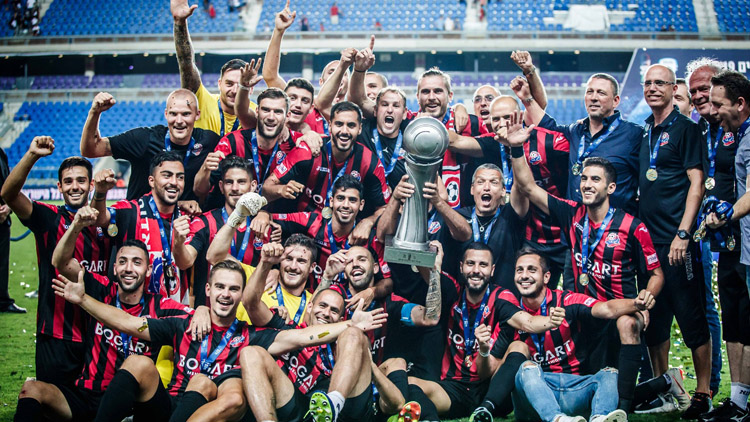
We do not usually think of it this way, but athletes are workers too, and they can also suffer from abusive environment in the workplace. The “outcast players” phenomenon is one recent case of fighting for workers rights, gaining public attention in Israel. The Israeli Football Players' Association is fighting against it, so far without success.

The case that has gained the spotlights recently is Hapoel Haifa player Chen Dilmoni (age 30), who fainted while practicing alone under instruction from the club’s management. He claims the incident was part of an attempt to pressure him to leave the team.
Dilmoni fainted while practicing alone in the heat of Israeli summer and lost consciousness. The medical team who reached the scene provided first-aid and evacuated Dilmoni for further treatment and testing to a hospital in Haifa. The Israeli Football Players Association strongly condemned the incident and called on the league’s management and team heads to work towards eradicating the phenomenon.
Dilmoni posted online about the incident, exposing many critical aspects of mistreatment in the workplace. In summer 2018, he signed a two-year contract with Hapoel Haifa, but by the start of the season, the club's managers had decided they were no longer interested in Dilmoni playing on the team. Another team submitted a proposed contract for the coming season, offering a lower salary than Dilmoni’s Hapoel Haifa contract. “When Hapoel Ramat Gan contacted my agent and expressed interest in my joining their team in the framework of their budget, he asked me what I thought and I said that I would really love to go back to the club I grew up in. We contacted the CEO of Hapoel Haifa, who said ‘take into account that there will be no compensation or payout’ – thereby not helping make the transfer happen,” Dilmoni said.
This is just one extreme example of a phenomenon known in the Israeli League as “outcast players” – players under contract who are instructed by their teams to train in humiliating and Impairing conditions: without other players, trainers or any professional staff. The goal is encouraging them to leave the team before the end of their contract. Putting this kind of pressure on the players causes them to lose precious time to improve their skills and gain playing experience, and sometimes even causes them to give up and concede the contract or find a different team to pay them at a lower salary. In other workplaces, this kind of treatment would be considered workplace bullying, in light of the humiliation suffered by the soccer players alongside the harm done to their physical capabilities and professional development.
According to Dilmoni, the club started to pressure him to leave and concede the money that the team owes him from the very start of training season.
“After training started, I was not invited with the senior team staff to the training camp and was left alone with no proper training framework… When the team came back from the camp, the team trainer met with me and told me clearly ‘you will not be here, we need to push you to leave, do you understand?” he said.
After the harsh conversation with the team trainer and the direct message asking him to leave the club Dilmoni’s real nightmare began. “Over the two weeks since the team returned from the camp, I have undergone a series of humiliations and illegal expulsions. These included training sessions separate from the team and the players at different and earlier hours in order to undermine my family life, forbidding me to join the other players’ meeting, and more.”
Dilmoni continues to describe his mistreatment at work and the enormous pressure placed on him to convince him to leave without compensation.
“With the exception of one day when I went to a team game, and one day – after receiving a warning letter from my lawyer – when they put on a show of letting me train with the team, I underwent two weeks of illegal hazing training, which mostly included exhausting one-and-a-half hour running sessions during the hottest hours of the day, on days when there were no scheduled team training" he said. "There weren't any tactical sessions, no workout focused on kicking or lifting, and of course I didn't have any practice games with the team.” Dilmoni also claims that yesterday morning, he warned the club’s staff that he wasn’t feeling well, but was sent anyway to train alone until he passed out and was taken to the emergency room.
Hapoel Haifa responded: “Chen Dilmoni receives athletic and material conditions at the highest level, including a training program, excellent medical care, and all other benefits according to the agreement. Dilmoni once again posted reckless lies against the team instead of focusing on searching for a team as agreed with him and as he committed to do. As stated yesterday, Hapoel prefers not to manage work relationships with its players via the media, will sue Dilmoni for libel following publication of his false statements, and will respond to his claims in court, should he file any.”
The players’ union called for an end to the practice of outcasting players.
“The players’ union once again condemns the outcast phenomenon. The union calls on the leagues’ management to accelerate negotiations between the parties and to include in the management’s regulations and players’ common contract a section which would prevent further cases similar to that of Chen Dilmoni. In 2019, team heads in Israeli soccer cannot allow themselves to act with crooked methods whose only goal is to break the player mentally and make him agree to break his contract with the club".






